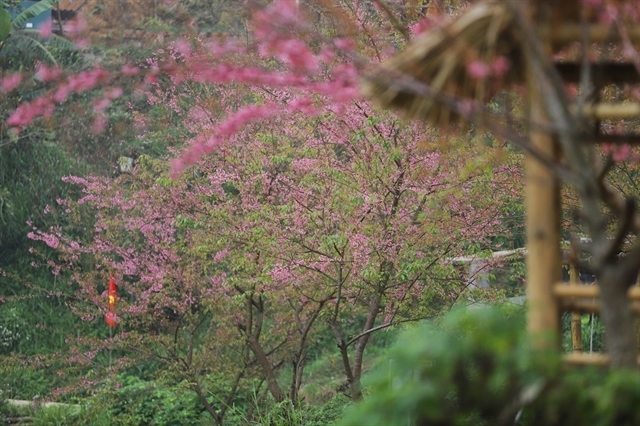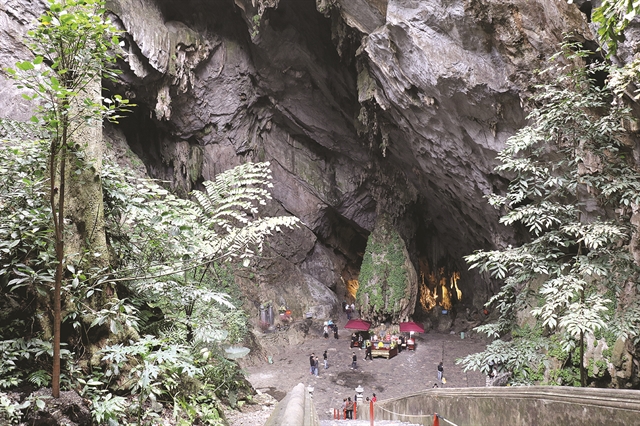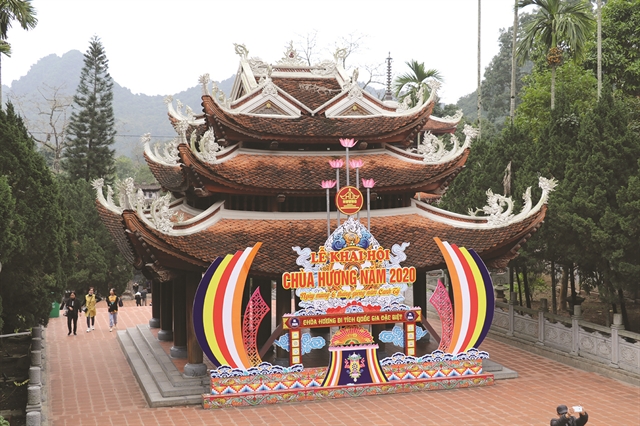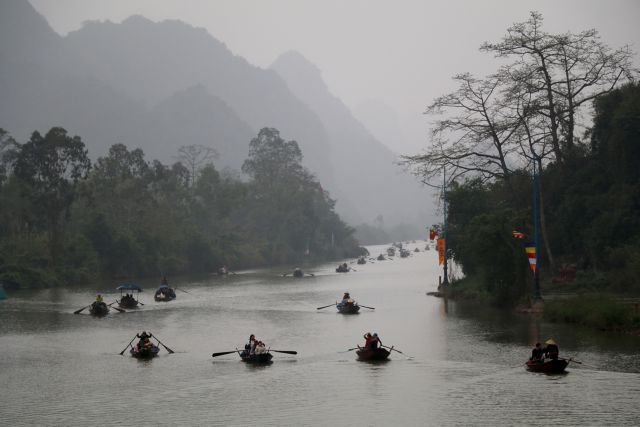 Features
Features

The Perfume Pagoda Festival, Việt Nam's oldest, biggest and longest-running festival, has officially been opened but due to the Covid-19 epidemic, the number of visitors has dropped sharply.
by Nguyễn Mỹ Hà
Having spent VNĐ5 million (US$230), Sáu is now counting each day that passes, while following the latest news from the Ministry of Health about the novel coronavirus (Covid-19). He is desperate for the epidemic to subside so he can get back on the water and paddle pilgrims to the pagoda and support his family.

|
| CAVERNOUS: Hương Tích Cave, named by Lord Trịnh Sâm in 1770 as the most magnificent cave in what was known as the Southern land. The Perfume Pagoda Festival is the country's oldest and biggest, and usually draws more than a million visitors each year. |
"This is a natural calamity we could not plan for," he says with a sad smile. "We have to follow the ban, but plan for when everything goes back to normal."
Making ends meet as a construction worker during the year, Sáu returns home to his picturesque Perfume Pagoda to take pilgrims to and from from the pagoda, tucked away in a beautiful grandiose cave in a remote mountain, accessible only by a one-hour boat ride and another half hour walk up the steep stone steps.

|
| DOCKED: At the wharf near the Perfume Pagoda, miles after miles of empty boats lay idle as all festive activities have been halted due to fear of the Covid-19 epidemic outbreak. VNS Photo Phạm Hoàng Văn |
The bad luck arrived on the first day of Tết, or Lunar New Year festival. Sáu received a phone call telling him to shut down his service, but the second day, he paddled his first clients to the Perfume Pagoda.
Like other families in his village, for the past 10 years or so, Sáu's family and others have been working around the festival. Sometimes they take their holiday a week early so they are still ready to ferry pilgrims and tourists during the height of Tết. They held big family dinners on the 23rd of the 12th lunar month, then planted young rice for the next crop before preparing for the new holiday season.
On the sixth day of the Lunar Year, the Perfume Pagoda Festival, Việt Nam's oldest, biggest and longest-running festival, was officially opened at the Trình Temple, the first stop on the three-stop journey to the Perfume Pagoda.
This year, due to the epidemic, the number of visitors has dropped sharply.
Tourism suffers

|
| SHOW TIME: The 2020 Perfume Pagoda festival kicked off on January 30, but saw a sharp drop in visitors due to the devastating Covid-19 epidemic. VNS Photos Đoàn Tùng |
Despite this, the tourism sector cannot sit still, and everyone from Sáu at the Perfume Pagoda to leaders of the country's tourism sector are taking action.
At a press conference held on February 6, Chairman of the Administration for Tourism Nguyễn Trùng Khánh said estimated losses in the next three months would range from US$5.9-7.7 billion, with the number of Chinese tourists dropping from 90 to 100 per cent. That meant a drop of between 1.7 - 1.9 million Chinese tourists, equivalent to $1.8-2 billion loss.
Other areas predicted a fall in tourist numbers of 50-70 per cent, resulting in a loss of $2.2-3 billion.
Based on a 2019 spending report from the tourism authority, all service sub-sectors including accommodation, dining, transportation, tours, entertainment and shopping could all lose $1-1.8 billion.
"The tourism sector is prepared to bounce back when the epidemic subsides," Chairman Khánh was quoted as saying at the press conference.
Health officials have estimated the Covid 19 epidemic could reach its peak in mid-February and slowly subside toward the end of March.
"It will take enormous effort to bring tourists back again even after the epidemic, but we have plans to come back in April with our focus on the local and long-distance markets, where the impacts of the epidemic have been minimal.

|
| LONELY MOUNTAIN: Yến Vỹ Stream is peaceful at the moment, so it's hard to imagine the usual height of festival season. |
Nguyễn Hồng Hà, deputy general director of Vietnam Airlines, said at the press conference that he believed that when the epidemic subsides, there would be a sharp increase in both local and international tourists.
"We need to be prepared with a detailed plan, because after the SARS outbreak in 2003 both local and international markets recovered quickly," he said.
Representatives shared their belief in the market's ability to recover, expressing confidence in the health sector's ability to control the epidemic.
Vũ Thế Bình, vice chairman of Việt Nam's Tourism Association, said: "The current epidemic is an unexpected incident, but it is also an opportunity for the tourism sector to give additional training to staff and improve accommodation and facilities to serve visitors better in the future."
Deputy Minister of Culture, Sports and Tourism Lê Quang Tùng said he was steering the country's tourism sector toward new markets, such as India with its one billion-plus population.
Believing there will be a sharp bounce after the epidemic, Trần Trọng Kiên from the National Tourism Consulting Council suggested the Government could lift or lower tax rates, issue visa waivers or lower the fees to lure visitors back.
Tranquil Perfume Pagoda
At Đục Wharf, where visitors usually step out onto small bamboo-leaf like metal boats to start their journeys, miles and miles of empty boats are anchored along the side of the canal.
More than five thousand boats lay idle at the wharf.
"We count the tickets sold every day, and it's only a few hundred," said a man we met at the pagoda.
At the cable car station, Nguyễn Thị Thu Hà who works on the ticket counter said: "On February 9, we welcomed 10,000 visitors."
This represents a huge jump from when the ban was lifted on February 2.
On Monday, we stopped at Chiến Thắng restaurant at Thiên Trù Wharf. In the empty restaurant that can serve up to 250 clients at the same time, Trịnh Thị Vinh, 46, said: "Now we only have 10 customers a day."
Last year, more than 1.4 million people visited the Perfume Pagoda, contributing 69 per cent to the district's entire income, according to a report from the District People's Committee.
"The record was 70,000 visitors in one day a few years back," revealed a man we met from the festival's management board, who declined to give his name.
Despite the news about school closures and flights and accommodation shut down, some optimists said this was a good chance for the nature around the Perfume Pagoda to revive and regrow.
"Local people also need to maintain their regular jobs to ensure their incomes, not just fall on the soft bed of easy income from tourism," said a frequent traveller.
But to look at the matter more closely, the Perfume Pagoda Festival runs from the first to the end of the third lunar month, usually between late January and early April.
"In the first lunar month, I used to wake up at 3am and finish my day at 10pm," said Vinh, the restaurant owner.
"In the morning, seeing a full house of people having breakfast was very satisfying. I didn't mind the long hours."
But that only lasted for the first lunar month, and after that the numbers slowly declined.
And for the boat rower Sáu, the most trips he makes in a day now is only three, which mean six hours of rowing back and forth.
"My muscles get burnt and swollen, so I use Salon Pas pads to cool down," he said. "But I don't mind waking up at 3am and working until 9pm. I'm looking forward to people returning to the Perfume Pagoda, bringing energy and joy. If people come, I can pay back the investment I spent on my boats." VNS
Perfume Pagoda Before Sơn Đoòng cave was discovered in 2009 and declared the biggest in the world, the Hương Tích Cave reigned as the Most Beautiful (The First) Cave in the Southern Sky according to Lord Trịnh Sâm. This accolade has been carved into the gate leading to the main pagoda. According to the Hương Sơn Thiên Trù Annals, Lord Trịnh assigned a Buddhist monk to look for a new site to build a Perfume Pagoda. The original Perfume Pagoda was located in Hà Tĩnh Province in an elevated cave, which was remote and hidden in the clouds. Some historians say the wives and concubines of the Lê Kings and Trịnh Lords were mostly recruited from the central coast provinces of Thanh Hóa, Nghệ An and Hà Tĩnh. In spring, they used to all leave to go to the Perfume Pagoda in Hà Tĩnh, which prompted the Trịnh Lord to find a new scenic land to build another Perfume Pagoda closer to the citadel for his ladies to pay tribute to Buddha. Built by the Trịnh Lord under King Lê Huy Tông's reign of Chính Hòa (1680-1704), the pagoda was destroyed during the resistance war against the French in 1947. Situated 70km southeast of Hà Nội, visitors can take a bus, motorbike or rent a car to get to Hương Sơn in less than two hours. But during crowded days, a kilometre can take more than an hour to pass. When he visited Hương Tích in 1770, Lord Trịnh Sâm likened the cave's mouth to a giant dragon fondling a huge jade ball. Inside the cave is a Kwan Yin statue caved from lime karst during the reign of Tây Sơn in the late 18th century. Thousands of stalactites and stalagmites in formidable shapes have been named by generations of pilgrims such as Mother's Milk Flow, Flower of Sorrow, Rice Mould, Money Mould, Little Prince Mountain, Little Princess Mountain, the Gold Tree, and the Silver Tree. Inside the cave, there's also a steep tiny path that leads high up to Heaven, and another narrow path that leads deep down to a wet cave dubbed "Hell". The cave leads visitors to believe that God created these beautiful ornaments and brought them all inside the cave to protect them for generations to contemplate. Droplets from the Mother's Milk continue to flow, making the cave humid and fresh at the same time. The country's most notable poets have composed immortal verses about the beauty of the Perfume Pagoda. Most notable is Hồ Xuân Hương (1772-1862) who wrote a poem sarcastically commenting on the Perfume Pagoda. Chu Mạnh Trinh (1862-1905) wrote his work praising the beauty of the pagoda in the 19th century, Tản Đà (1889-1939) also wrote a couple of poems. Nguyễn Nhược Pháp (1914-1938) wrote a poem, which was so melodic, it was later made into a song. Early 20th century scholar Phạm Quỳnh (1892-1945) also wrote about the pagoda in his travel journals. VNS |




